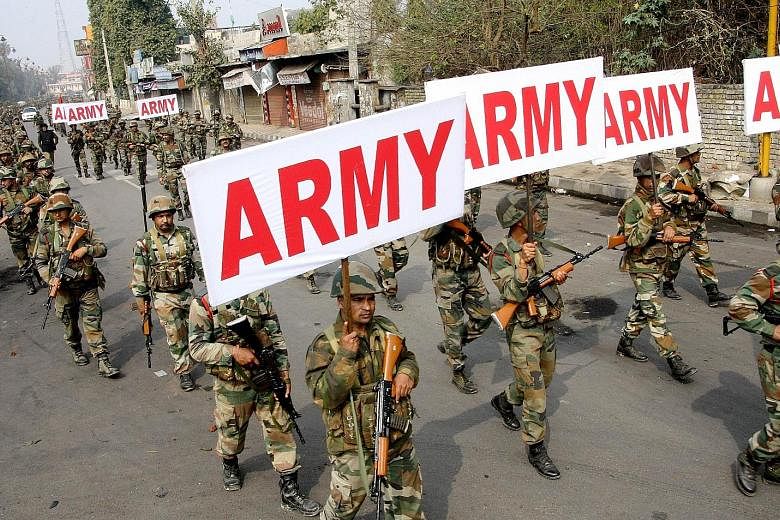Violent protests for caste rights over the last few days in Haryana state have left more than 10 people dead and 100 injured, and are now also causing a water crisis in Delhi.
The Delhi government ordered schools to shut today after protesters damaged equipment at the Munak Canal, which provides over 60 per cent of water to Delhi.
Yesterday, they also shut down all major highways leading into Delhi, which shares a border in the north, west and south with Haryana.
There have been violent protests for the last three days in Haryana, where the Jats, an upper caste farming community, are demanding quotas in government jobs and education institutes. They want to be included in the 27 per cent "reservation", as the quotas are known, enjoyed by the lower castes like the Dalits, as part of affirmative action.
The Jats are present in large numbers in nine northern states, including Haryana. Some have become rich by selling land - prices have shot up mainly around Gurgaon, the Delhi satellite town in Haryana - but younger Jats are struggling to find jobs as farming incomes have remained low and unpredictable.
Agriculture is one of the slowest growing sectors in India, averaging less than 3 per cent a year.
-
WHAT PROTESTS ARE ABOUT
-
WHO ARE THE JATS?
The Jats are an upper caste farming community in India. The Jat community is present in large numbers across nine northern Indian states, including Haryana, and is known for its conservative patriarchal system.
WHAT DO THEY WANT?
They are demanding quotas for government jobs and in educational institutions.
Delhi Chief Minister Arvind Kejriwal yesterday urged Delhi residents to "save as much water as possible". He also said water will be rationed.
He said: "Water to Delhi has been stopped because of the agitation in Haryana. There is a severe water crisis, and we have to be prepared for it. Many water treatment plants have been shut down."
The situation in Haryana stayed volatile yesterday, although by evening, it appeared that talks between the government and Jat leaders had made some headway.
One of the Jat leaders, Mr Jaipal Singh Sangwan, urged protesters to end their agitation after the government agreed to legislate reservations for Jats at the Budget session of the Haryana assembly. But it is unclear whether other leaders would agree and if the protests would end.
Protesters yesterday blocked highways and damaged public property, in spite of a curfew imposed in half a dozen towns and the presence of thousands of security forces, reports said.
A ticket counter in a railway station in Gurgaon was burned down yesterday, while the protests disrupted the schedule of hundreds of trains and affected the production of cars at India's largest carmaker Maruti Suzuki. The company suspended production at two of its Haryana plants on Saturday.
Reservations in government jobs and educational institutes - meant for lower castes that suffer from extreme poverty and discrimination - is a highly emotive issue.
People from upper castes often resent the quotas as they feel that the jobs should be theirs. Last year, protests broke out in Gujarat where the Patidars or Patels, a landowning community, demanded a share of government jobs and college places.
Experts said youth unemployment and a crisis in agriculture were fuelling reservation demands.
"Everyone is asking why these well-to-do communities are asking for reservations. But farming is in crisis... Incomes haven't gone up," said Professor Sanjay Kumar, director of the Centre for the Study of Developing Societies in Delhi. "This has resulted in great dissatisfaction within farming communities."

